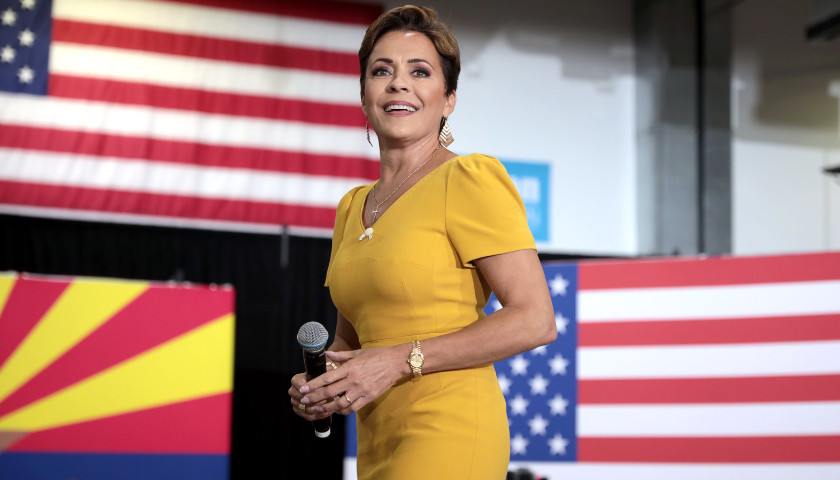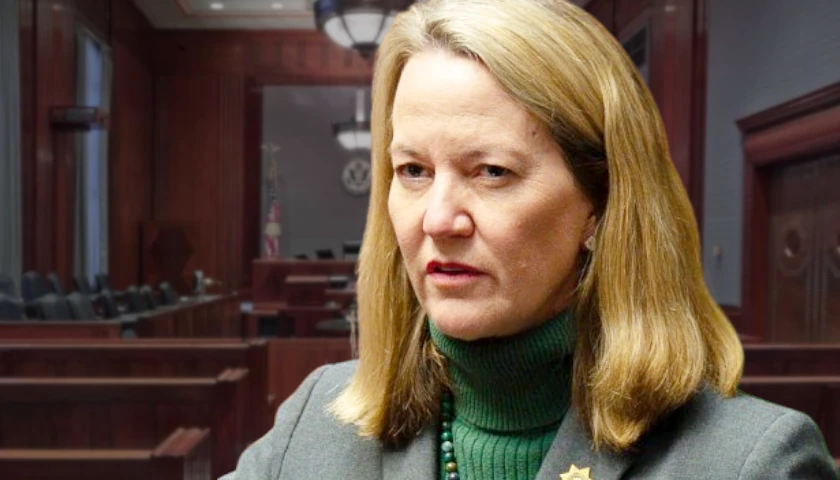The first report from Arizona Attorney General Mark Brnovich’s investigation into the results of the Maricopa County independent ballot audit is out, and it includes criminal prosecutions. Addressed to Senate President Karen Fann (R-Prescott), who launched the independent audit, the “interim report” referenced the work of his office’s Election Integrity Unit. Brnovich stated, “The EIU’s review has uncovered instances of election fraud by individuals who have been or will be prosecuted for various election crimes.”
Leading gubernatorial candidate Kari Lake, who just called for the results of the 2020 presidential election in Arizona and Wisconsin to be reversed, told The Arizona Sun Times, “Today, Attorney General Brnovich confirmed what most of us have known since November 3rd, 2020: The election in Maricopa County was crooked and never should have been certified. This is not a Republican or Democrat issue. It’s an American issue. I look forward to seeing the prosecutions that the Attorney General has in store. It’s time for the perpetrators of this fraud to be held accountable for their actions.”
In Wisconsin, Republican county leadership or district resolutions in 37 of Wisconsin’s counties, constituting 51 percent, called to decertify the election. Lake shared a graphic on Twitter displaying the counties.
Brnovich’s letter said the investigation found “serious vulnerabilities that must be addressed and raises questions about the 2020 election in Arizona.” Since the investigation is ongoing, the findings that could be released were limited. The EIU found “problematic system-wide issues that relate to early ballot handling and verification.” The signature verification system in place within Maricopa County is “insufficient to guard against abuse.”
Part of the problem, he said, was that election workers only had seconds for each signature verification, an average of 4.6 seconds. A second critical problem involved chain of custody of ballots. “Maricopa County failed to follow critical procedures when transporting early ballots from drop locations to the election headquarters.” The EIU estimated 100,000 to 200,000 ballots fell into this category.
The report accused the county of not turning over requested records. “Maricopa County occasionally chose a combative and/or litigious approach to providing requested information rather than assuming a posture of transparency.” The obstruction became such an issue that State Senator Kelly Townsend (R-Apache Junction) issued a subpoena to the Maricopa County Supervisors demanding to know why (the AGO does not have that subpoena authority).
The report also addressed the county’s response when Brnovich first asked the county to freeze all materials related to the 2020 election, which is standard practice for the office when conducting a civil/criminal investigation. “Maricopa County initially interpreted the letter as an attempt to sequester all election equipment and twice threatened legal action.”
It took the county nearly four months to respond to the EIU’s first request for documents. After examining those documents, the EIU “found several deficiencies, including Maricopa County’s failure to provide internal policies and procedures that had been disclosed to litigants in various court proceedings, but were noticeably absent from the document set.”
The letter accused the county of not even responding to its third request for documents until Townsend sent her subpoena, and when it did, failed to turn over information related to a key policy that was requested. That policy was the “extra-statutory ‘Household Exchange’ program used by the county to rehabilitate early ballot affidavits signed by the wrong family member.”
The EIU’s third letter to the county requested signature files of ballot affidavits identified as being problematic by Dr. Shiva Ayyadurai in his most recent analysis of signatures. His previous analysis, which was for the independent ballot audit, only examined whether or not the signatures were present; it did not look into whether the signatures matched ones on file. Brnovich said in his letter that the county failed to respond adequately to that request, failing to turn over signatures from the voters’ original registration form.
He makes numerous recommendations, including changing the laws to require the immediate production of documents when requested by the Attorney General. A bill that would have provided the AGO with civil subpoena powers failed this session in the Senate due to State Senator Paul Boyer (R-Glendale), who frequently votes with the Democrats, voting against it.
Another improvement Brnovich said must be made is to put “stronger procedures in place for early-ballot signature verification, and those procedures need to be uniform across the state.” This should be done by legislation, he stated. He said matching the voter’s ballot affidavit signature to their signature on file is “the most important election integrity measure when it comes to early ballots.” Current state law should be expanded beyond merely requiring election workers to “compare” signatures, such as by adding a minimum time requirement to examine the signatures.
He warned that due to the decrease in signature verification in Maricopa County, “the last three election cycles reflect that the number of early ballots rejected because of missing and mismatched signatures is trending down.” This took place despite significant increases in people voting. A new law implemented in 2020 requiring a 5-day cure period for rejected ballots did not explain the discrepancy, since the “dramatic decrease” also took place in 2016 to 2018.
Brnovich cited Ward v. Jackson, a lawsuit filed immediately after the 2020 presidential election in Maricopa County, where both the plaintiff’s and defendant’s experts found that out of 100 ballot affidavit signatures, several were “inconclusive.”
Another recommendation he proposed to fix the problems is to require showing government-issued ID when voting by early ballot. The legislature referred the Arizonans for Free Elections to the ballot this fall, which would implement that measure.
Ballots transported from drop boxes without a chain of custody was a significant problem. There were 901,976 ballots collected from drop boxes in Maricopa County. Out of 1,895 Early Voting Ballot Transportation Statements, “381 or 20 percent were missing required information.” This meant possibly “somewhere between 100,000 and 200,000 ballots were transported without a proper chain of custody.” The information missing included ballot count fields, missing audit and courier signatures, and documentation of security seals.
Lack of chain of custody violated the state election procedures manual (EPM). He noted that Democratic Secretary of State Katie Hobbs failed to provide his office with an updated EPM for 2022, violating ARS 16-452. He warned, “[T]here is currently no EPM in place governing the 2022 election.” He recommends that the legislature pass legislation “increasing transparency in early ballot chain of custody,” and ban unmonitored drop boxes, which HB 2283 would do.
Another recommendation was for the legislature to pass a law empowering the state auditor to regularly audit election systems. He suggested “increasing the penalties for election-related crimes and adding protections for whistleblowers.” He specifically singled out governmental or nongovernmental entities that are aware of ballot harvesting.
Brnovich is still conducting a review of whether private grant monies used by Maricopa County, as well as by Hobbs and Pima County, were illegally used by election officials to influence the manner in which citizens voted. Since the 2020 election, a law was passed banning election officials from using private money at all.
Brnovich said more information continues to come in about fraud in the election for him to investigate, “including as recently as yesterday.”
– – –
Rachel Alexander is a reporter at The Arizona Sun Times and The Star News Network. Follow Rachel on Twitter. Email tips to [email protected].






[…] Rachel Alexander with The Tennessee Star reports: […]